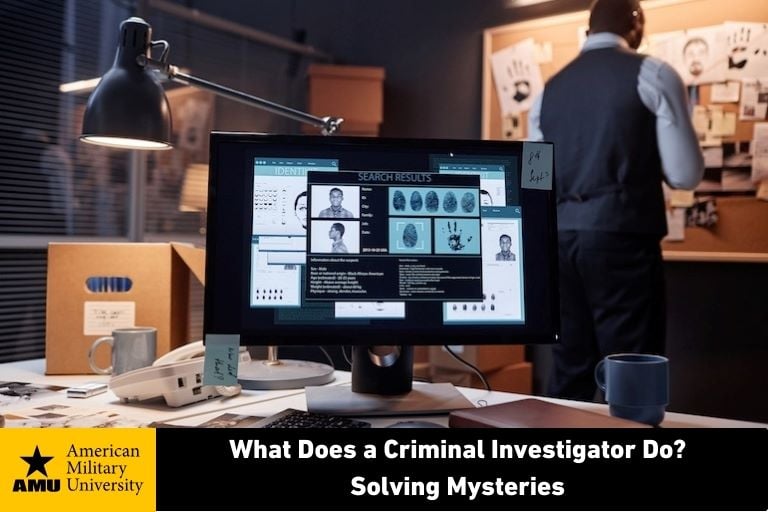By Dr. Jarrod Sadulski | 02/04/2025

Criminal investigators are law enforcement officers who play an essential role both in the criminal justice system and the protection of public safety. A key element of their work involves solving crimes.
Criminal Investigator Responsibilities
Criminal investigators (also known as detectives) unravel mysteries involving criminal scenes. When a crime occurs, they are called upon by police officers to help determine what happened and who is responsible. They enable other law enforcement personnel to apprehend suspects linked to criminal activity.
While conducting investigations of crime scenes, criminal investigators identify patterns to determine how a crime was committed. They analyze records to piece together what transpired at crime scenes.
As a part of their investigative work, criminal investigators may also conduct surveillance of suspects seen by eyewitnesses or surveillance cameras at or near crime scenes. The information they glean from this work may lead to the issuance of search and arrest warrants.
Based on physical information from a crime scene, along with their investigative insights, they write detailed case reports. Prosecutors depend on accurate, complete, and detailed reports when they present a case in court.
What Happens at a Crime Scene
When a crime is committed, criminal investigators lead the investigation, conduct witness interviews, and collect evidence. They work closely with other law enforcement personnel. For example:
- Road patrol police officers secure and may collect evidence from crime scenes.
- Responding police officers protect any physical evidence from being disturbed by people or the elements like rain or snow.
- Detectives and criminal investigators provide direction to crime scene investigators. They also receive special training to ensure that any digital devices that are collected from the crime scene remain undisturbed. Also, criminal investigators use special equipment to keep criminals from remotely erasing digital evidence from laptops, tablet computers, or smartphones.
Fingerprint Evidence Collection
Detectives and criminal investigators gather forensic evidence from crime scenes. For instance, they dust for fingerprints.
They can also use cyanoacrylate fuming chambers to detect latent fingerprints on non-porous surfaces like glass or plastic. According to an Egyptian Journal of Forensic Sciences article written by Gurvinder Singh Bumbrah, these fuming chambers deliver stable, white-colored fingerprints.
Investigators run fingerprints through the FBI’s Integrated Automated Fingerprint Identification System (IAFIS), the world’s largest biometric database. The IAFIS enables criminal investigators to compare crime fingerprints against over 55 million fingerprints in the database. The IAFIS automatically retrieves fingerprint images and utilizes digitized ridge details and various fingerprint characteristics to help law enforcement professionals to locate a match.
DNA Evidence Collection
Processing crime scenes involves gathering physical evidence left at the scene. Violent crimes tend to leave a significant amount of evidence.
Whether collecting fingerprints or DNA evidence, criminal investigators are responsible for determining the validity of the evidence based on where it was collected. This work is necessary to ensure that misidentification does not occur.
Forensic science has vastly developed over the past couple of decades to aid in these investigations. DNA can be collected from:
- Objects that a suspect or victim touched
- Biological substances – blood, skin tissue, or hair
- A person's body
During my work investigating crimes and processing crime scenes, I’ve seen burglars leave behind tools like hammers and latex gloves. Investigators can use touch DNA to gather evidence left on any object an offender touches.
Criminal investigators rely on the use of this type of DNA to identify suspects and victims. DNA samples are entered electronically into the FBI’s Combined DNA Index System (CODIS). This forensic science technology database makes it possible to identify suspects by linking crimes to known offenders whose records are in CODIS.
For example, criminal investigators may investigate a murder that occurred in a home. Fingerprint or DNA evidence collected within the residence next to the victim is viable evidence. However, evidence collected outside of the home is less reliable, since anyone may have left fingerprints or DNA evidence.
Once the DNA evidence is collected as a part of a criminal investigation, scientists analyze it in a laboratory. DNA analysis involves:
- Extracting DNA from cells
- Producing multiple copies of DNA to characterize it
- Separating DNA to enable identification
Preparing to Become a Criminal Investigator
Investigative work is a satisfying career. For victims and their families, investigators are their best hope at bringing closure to a case.
A criminal investigator works tirelessly to get the facts of a case. As law enforcement officers, they need to be well versed in criminal law and local laws.
Criminal investigators may choose to specialize in a particular area of criminal law. Common areas of specialization include:
- Homicides
- Drug enforcement
- Financial crimes
- Human trafficking
- Cybercrimes
Criminal investigators may work at a federal law enforcement agency, a state law enforcement agency, or a local law enforcement agency. The requirements of becoming an investigator vary depending on the employer.
Detectives and criminal investigators typically receive advanced education regarding conducting investigations. Investigators usually have considerable criminal justice or law enforcement experience, passing scores on physical fitness tests, good written communication skills, and knowledge of federal or state statutes.
Criminal investigators go through a detailed background check at most agencies. Experience in a relevant field that is related to investigations and strong communication skills can be especially helpful for an aspiring criminal investigator.
Criminal investigators typically start a law enforcement career as road patrol officers, which enables them to gather information, understand criminal behavior, and build their investigative skills to solve crimes. For instance, road patrol officers commonly interview witnesses and may also collect evidence. Developing these skills can be helpful for future criminal investigations.
Educational Requirements for Criminal Investigators
Nearly all agencies require criminal investigators to have at least a high school education. Some agencies, including many agencies within the federal government, require candidates to have a bachelor's degree and police academy training.
Many criminal investigator candidates earn a degree in a criminal justice program or related field. Aspiring criminal investigators and other law enforcement officers can also supplement their education with military service.
If you plan to seek job opportunities as a criminal investigator, be sure to examine agency-specific requirements as well as labor statistics in the field before taking the next step. Planning in advance can help you decide if pursuing a career in as a criminal investigator is right for you.
Criminal Justice Degrees at American Military University
For adult learners interested in learning to become a criminal investigator or following another career path in criminal justice, American Military University (AMU) offers four criminal justice degrees:
- An online associate of arts in criminal justice
- An online bachelor of arts in criminal justice
- An online bachelor of science in criminal justice
- An online master of arts in criminal justice
Courses in these degree programs are tailored to meet the educational needs of students and include evidence and procedures, intercultural communication, and criminal investigation. Other course choices include criminology, ethics in criminal justice, forensics, and crime analysis.
For more information about these degree programs, visit AMU’s criminal justice degree program page.
Note: These degree programs are not designed to meet the educational requirements for professional licensure or certification in any country, state, province or other jurisdiction. These programs have not been approved by any state professional licensing body and does not lead to any state-issued professional licensure.

Dr. Jarrod Sadulski is an associate professor in the School of Security and Global Studies and has over 20 years in the field of criminal justice. He holds a bachelor’s degree in criminal justice from Thomas Edison State College, a master’s degree in criminal justice from American Military University, and a Ph.D. in criminal justice from Northcentral University.
His expertise includes training on countering human trafficking, maritime security, mitigating organized crime, and narcotics trafficking trends in Latin America. Jarrod has also testified to both the U.S. Congress and U.S. Senate on human trafficking and child exploitation. He has been recognized by the U.S. Senate as an expert in human trafficking.
Jarrod frequently conducts in-country research and consultant work in Central and South America on human trafficking and current trends in narcotics trafficking. Also, he has a background in business development.

